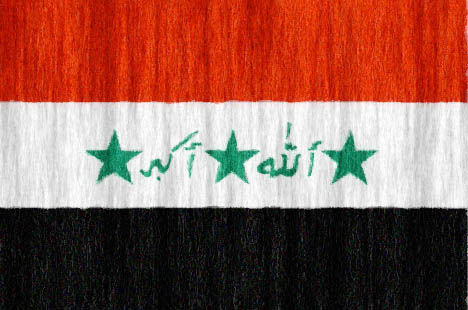AFP/Baghdad
More than 1,000 Sunni fighters from Anbar joined Iraq’s Popular Mobilisation force yesterday as part of government efforts to make the fight against the Islamic State group a cross-sectarian drive.
Political, security and tribal leaders attended a large parade at a base in Amriyat al-Fallujah in a bid to give new momentum to the province’s homegrown anti-IS fightback.
“Your country has been stolen by a bunch of thieves and thugs and you must fight to take it back,” Anbar Governor Soheib al-Rawi said at the event.
“Let this day be the day when we declare a massive revolution against Daesh... kick Daesh out of our homes, fight their extremist ideology and tighten the noose around them,” he said, using an Arab acronym for IS.
Parts of Anbar province have been under militant control since before the nationwide June 9 offensive by IS, and the capital Ramadi has been on the brink of falling completely for months.
The counter-offensive has so far been spearheaded by Shia militias, some of which are now operating under a government-controlled umbrella known as the Hashed al-Shaabi—or Popular Mobilisation Brigades.
However, Prime Minister Haider al-Abadi has been keen to deflect criticism of the organisation as a Shia-only body, and has defied challenges within his own camp to push for the inclusion of Sunni fighters in their home provinces.
Hundreds of Sunni tribal fighters had already been fighting under the Popular Mobilisation banner in Anbar in recent weeks, but yesterday marked their official recruitment.
Sunni fighters in the troubled western Iraqi province had so far been using their own weapons and not receiving payment.
The new system comes with an organised vetting process designed to avoid the lack of accountability that prevailed under previous attempts to enlist Sunni fighters in recent years.
Rawi said that, according to Abadi’s executive order, the plan was for the Sunni force with the Popular Mobilisation units in Anbar to reach 6,000 men.
Twin bombings outside mosque kill 17
Twin bombings outside a Shia place of worship in eastern Iraq killed at least 17 people as they filed out after Friday prayers, police and hospital sources said.
A parked car laden with explosives blew up near the exit of the mosque in Balad Ruz, and when bystanders gathered to evacuate the wounded, a suicide bomber detonated himself among them.
A further 37 people were wounded in the attack in the eastern province of Diyala. Local military commander Adnan al-Tamimi was among the dead.
Another car bomb exploded in the parking lot of a Shia mosque in the Kanan district of Diyala, wounding several civilians.
Iraqi officials declared victory over Islamic State militants in Diyala earlier this year after security forces and Shia paramilitaries retook towns and villages from them in the mixed province, which borders Iran.
But the insurgents remain active despite no longer holding any urban centres.

